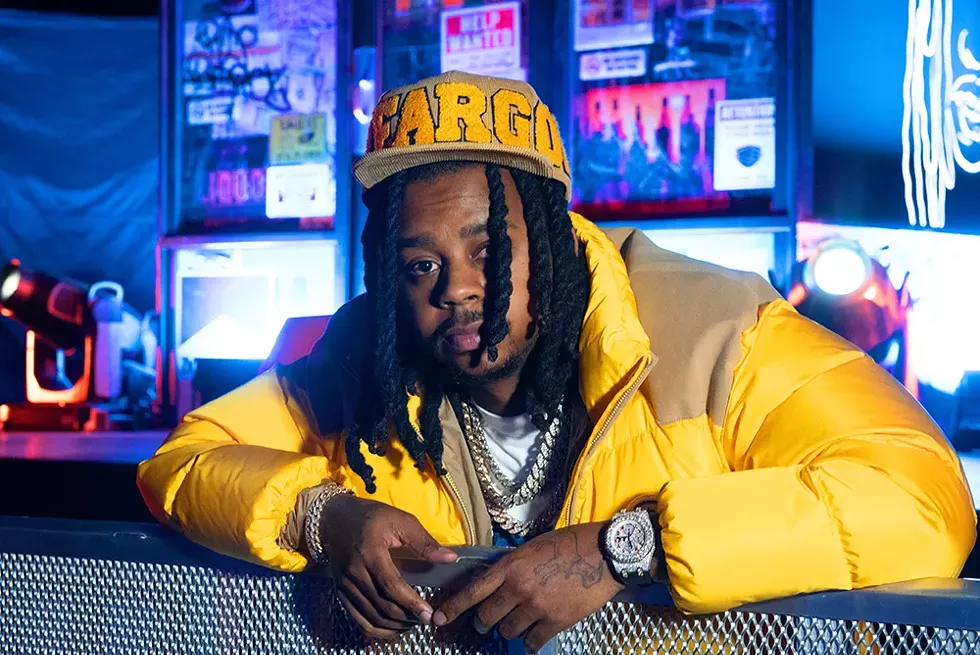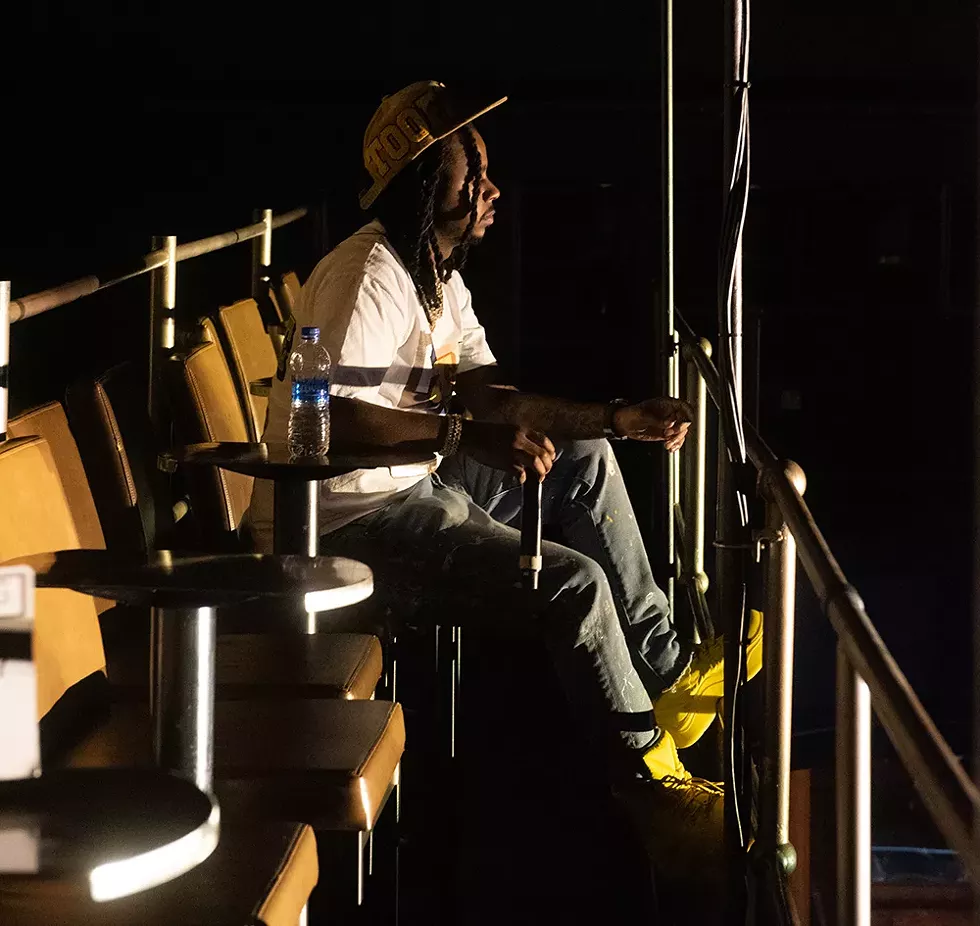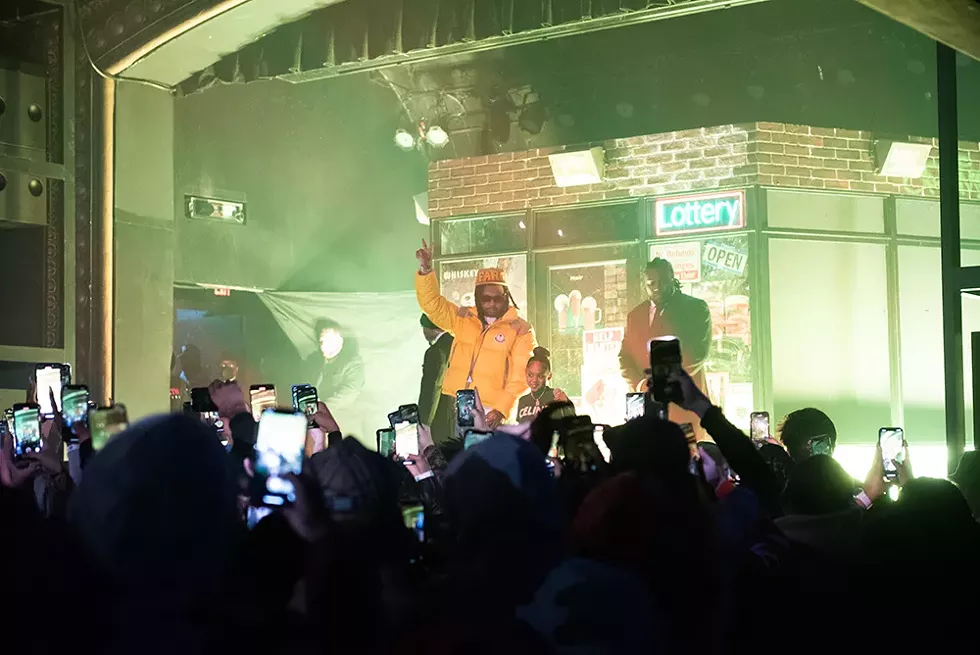
It's 4 p.m. on a recent day in January, and downtown Detroit's Saint Andrew's Hall is bustling with all the moving parts needed for the evening's show, a one-off record release performance featuring rising Detroit rapper Babyface Ray. The security team, dressed in all black from head to toe like the New Orleans Saints, are huddled up, going over game plans for security checks, crowd control, and safety precautions. The sounds of clinks and clanks from the bartenders stocking beverages echo louder than usual in the mostly empty hall. Sound and lighting engineers are tightening brackets, plugs, and testing equipment. On the stage, a custom-built set resembles a Detroit-style liquor store, complete with graffiti and a glowing neon sign that reads "LOTTERY."
Baroline Diaz, who manages Ray, is in the middle of it all, dressed in sweatpants and a crop-top and multitasking, passing out wristbands, telling opening acts their stage times, texting, calling, and delegating.
Everything is in place — except the headliner, who's running late for his 4:30 p.m. soundcheck.
"Babyface Ray is four minutes away," she yells to the room in her thick Dominican accent.
Diaz is a music industry vet who's helped navigate the careers of big-name national acts like EST Gee, DaBaby, Moneybagg Yo, and Polo G. She's also the vice president for Interscope records, but moonlights as the manager of Babyface Ray. "I'm really not supposed to be doing this, but Interscope knows," she says through a laugh.
She says she was drawn to Ray a year ago after hearing Moneybagg Yo and EST Gee constantly playing his music. Though she was unable to sign him to a record deal due to his current deal with Empire Records, after coming to Detroit to meet him she knew she still wanted to work with him.
"When I first met him, he had 52 monthly listeners on Spotify," she says. "Now we hit 3 million. His socials grew by 50 percent. Everything was there, but there wasn't no structure."
Since then, Ray has performed at huge music festivals like Rolling Loud, Day N Vegas, and Lyrical Lemonade; toured with collaborator Jack Harlow; and has charted in the top 10 on Apple Music.
Although Diaz has aspirations of Grammy awards and Coachella stages for Ray, she also says she wants him to value the journey and appreciate the moment.
"Tonight is a big night for us headlining his city," she says enthusiastically. "First day we sold 561 tickets. There are some cities they don't support their artists. Tonight is going to be a powerful night. I told him he's going to need to take a moment and take it all in because this is just the beginning of something that's going to become huge."
Ray's latest record, FACE, officially dropped the day after the show, on Friday, Jan. 28, and in the weeks since has already earned heaps of critical praise. Rolling Stone said Ray "already made one of the year's best rap albums." Complex declared, "Babyface Ray's moment is now." Stereogum asked, "Can Detroit cult hero Babyface Ray become a national star?"

At 5 p.m., three hours before showtime, Babyface Ray nonchalantly walks through the double doors of Saint Andrew's Hall as if he's a regular fan there to see a hip-hop show, dressed in paint-splattered jeans, a yellow Monclear puffer coat, and a TooFarGone chord hat. Diaz eyes him and yells, "I'm going to start calling you 'Babyface Late!'"
Ray sheds the coat, does the soundcheck, then runs through an abbreviated version of his set. Then he grabs a bottle of water, takes the front stairway to the balcony, and sits down.
Ray admits he's always been a bit socially awkward and standoffish, both in interviews and generally around people he doesn't know. But as his popularity has soared, he's adapted.
"It started off as that because I never knew everyone's intentions," he tells Metro Times. "But now I'm just playing the game how it goes. It is what it is."
Born Marcellus Register, the 31-year-old's musical ascension has been a slow burn for 10 straight years, but his life's experiences have shaped his lyrics and crafted his artistry. He's the son of a pastor with four brothers, and his parents are still happily married. The Register family lived for a brief period of time on the west side of Detroit, but mainly resided on the east side. Though Ray frequented church growing up, his father also encouraged him and his brothers to follow their own paths in life.
"Pops was super spiritual," Ray says."Something happened to him where he became in touch with God.".
Ray dove into hip-hop in 8th grade and continued rapping through high school under the names Chaos the Kid and Richy Rich Ray, inspired by local hip-hop acts Rock Bottom, Stretch Money, and Blade Icewood. Soon, Ray found a fitting name that he would stick with.
"It came from people just saying I'm not aging," he says of his rap moniker. "My grandma used to always call me Baby Ray. I said it in a song and it kind of stuck."
Growing up, Ray's parents shielded him from any of the hardships they faced, but all that changed when Ray's father lost his job, his oldest brother was imprisoned, and his mother was diagnosed with breast cancer.
"Now that I'm looking back at it, I can see it didn't affect me, but it sculpted and molded who I am now," he says. "I'm the youngest of four brothers, but by the time I got to high school I was the only one in the house. So I was kind of, like, in a world of my own."
He adds, "Kind of how I became standoffish."
The incarceration of his brother also led to a trigger reaction that pulled Ray into street life.
"When my brother got locked up, my cousin came and grabbed me and pulled me under his wing," he says. "That's when I got introduced to the streets."
While in high school he met Phillip Glen-Earl Peaks, aka Detroit rapper Peezy, through a friend of a friend, and they (along with Dame, Lou, Lil P, D-Nice, and Snoop) formed the rap group Team Eastside in the mid-2000s. The crew took a guttural, knock-ya-teeth-out approach to hip-hop, with songs like "Fuck Yall Niggas" and "Work" tailor-made for Detroit clubs.
"We started a whole culture of rap," Ray says. "We initiated a lot. A lot of key players in Team Eastside are still functioning and doing their thing right now. We put a lot of energy into the city."
Songs like "Eastside Nigga Fucking Westside Bitches" and "Eastside Where the Real Money At" were sparked in strip clubs, and eventually found massive street followings. While Team Eastside didn't make many videos back then, Ray says he enjoyed the anonymity.
"I was more known for my voice from those songs because we never shot a video," he says. "I would be in a club, they would be playing my song going crazy, [and] I would be standing right there and no one would even know."
By 2013, the members of Team Eastside were pursuing their own individual musical interests. Ray knew he had the ability to stand on his own as an artist, but he was still compromising his musical aspirations with his forays into street life.
"You gotta think, I was hanging with my cousin, who was a high roller, so they had money and the shit that rappers were rapping about. He kind of pulled me away from rap," Ray says, before pivoting to a basketball analogy. "For a long time I was procrastinating, just shooting towards the wrong basket by trying to be in the streets instead of chasing my dream."
Things intensified when Ray was shot in the foot while intervening in a violent altercation involving his brother. "They tried to walk him in the house and he didn't let them come in," he says. "Then they were struggling with him trying to get him in the car. I went out trying to diffuse the situation."
Ray suffered another devastating blow when his son was stillborn. "Everything was happening right around the same time," he says. "Right when I was in between the music and the streets, when I was trying to figure myself out, I lost my son. That fucked with me for a long time. I was in a dark, dark place. That's when my religion became shaky a little bit, because I was questioning God, like, 'How can that happen to someone so genuine and pure?'"
Ray says he self-medicated with pills and lean until he was able to regain his focus toward his life and music. "It wasn't until somebody else in the streets put the battery in my back and told me I had a gift," he says. "That's when I started taking risks and shooting jumpers. I was scared of what people would think of the decisions I would make. And then when I started being creative and doing the shit that I thought in my head, everything fell into place."
Ray regained his swagger, and released the Young Wavy mixtape in 2014 and the Mia Season album in 2015. Both projects encompassed that Team Eastside aggressiveness mixed with a more melodic sound that highlighted Ray's new relaxed flow.
"They put me on pain pills after I got shot," Ray says. "If you listen to my old music, I was more energetic. When I started taking pills I got more relaxed and I found my true self, the nonchalant face. That's where the 'wavy' comes from."
Over the next five years, Ray continued to release new music, every project better than the previous one. He says he wanted to take chances sonically to separate himself from the pack; he didn't want to be the typical Detroit rapper with the same sound as everyone else. He put a studio in his home, and learned to engineer his own sessions.
In 2020 he released his biggest hit to date, "Paperwork Party." The song was powered by a pulsating bassline that perfectly matched Ray's monotone vocals, and garnered millions of views and streams. The remix with Jack Harlow received millions more.
"It was my birthday and I just bought a new watch," he says. "And at that time it was a challenge going around on Instagram where niggas would come out of jail showing their paperwork. And I'm like, fuck all of that. Like is your paperwork right? Is your money right? That's where the idea for that song came from. My 'paperwork party' was talking about money."
By 2020, Ray felt he had accomplished as much as he could in Detroit and was looking to branch off into a record deal with Empire. His goals had moved past being the hottest rapper in his own city.
"I had been trying to chase [Empire CEO Ghazi Shami] down," he says. "I knew I was good enough. He had signed Snap Dogg, Molly Brazy, Allstar JR, and Peezy."
As communication with Empire stalled, another label stepped to the plate. "Me and [Yo Gotti] was actually sitting down in the MGM lobby and he was actually trying to give me the checkbook like, 'What we doing, Face? Come on to CMG,'" Ray says. "As soon as I got up from the meeting I got a DM from Ghazi and he was like, 'Fly to San Francisco, I want to deal with you directly.' And the rest is history."
The first project with Empire was last year's Unfuckwitable, an EP Ray describes as "a year and a half of emotions of just what I was going through." But his latest, FACE, serves as his most complete work to date.
The album begins with "My Thoughts 3 / Pop's Prayer," a lyrical, sentimental, and meditative perspective to this new threshold of his career.
The song is the most endearing and motivational cut on the album, and ends with a touching prayer from his father. "I come asking for Your choice blessings on my baby boy, Ray," he prays. "Asking for Your guidance and Your directions for his gifts and his talents, that You might wrap him up with Your love, Your grace, and Your mercy."
Production-wise, Ray assembled his own dream team of sorts for FACE. Romano, ATL Jacob, Southside, 808 Mafia, OG Parker, and DJ Esco all make strong musical contributions, but Ray has never been the kind of artist that needed to lean on dope beats to carry himself. His calling card has always been the lyrical craftiness, wit, and transparency he's able to convey in trap house narratives and hot boy sagas.
To be blunt, Ray talks his shit as good as anyone in the rap game.
"We them niggas, you know it / Dior Timbs, it's snowin'. I catch her, you know she goin' / Ain't see me, you hear the motor," he raps on "Let me Down."
On "6 Mile Show," Ray teams up with fellow eastsider Icewear Vezzo. "It's a mess on my neck, keep starin' at me / 'Face, what it it or? 'They keep askin 'me. Just hopped off the stage, hoes grabbin' me / Man, the money-counter still ain't fast as me," Ray raps on the hook.
The album also features guest bars from big names in hip-hop like Yung Lean, G Herbo, Pusha T, Wiz Khalifa, and Detroit all-star 42 Dugg. Ray says there are more visuals planned for FACE, along with a spring tour.
Even with the solo success, Ray says he will always be available for another Team Eastside album, and he's extremely appreciative and humbled by the decade-long journey to get to this space in his career. "The time it took to get here creates character," he says. "The ups and downs of everything I went through makes it mean so much more. My fans know that, too. They been riding with me so long that they're just happy to see me get to this point."

It's almost showtime. Despite the fact that many local shows have been canceled due to the pandemic, and despite the fact that the temperature is below 30 degrees, the line to enter Saint Andrew's Hall is wrapped around the corner. Security is doing the standard pat-downs, checking IDs, and informing fans that the show is sold out if they don't have a ticket. Merch tables are set up in the lower Shelter part of the hall, and patrons are aggressively trying to position themselves in the front of the stage, while Ray's parents and other family are seated in the middle of the balcony.
"I like him because he raps about stuff he's been through," says one 18-year-old fan who drove from Lansing to attend the show.
After a good 30 minutes of the DJ priming the crowd, Ray's 7-year-old daughter Santana introduces the emcee as the crowd makes enough noise to shake the building. Ray begins with, "My Thoughts 2," then segues into his track with Peezy, "36oz."
Ray doesn't go into long monologs between songs, and rarely switches up his even-keel demeanor. He doesn't swing his hair, do backflips, or take his shirt off. He's simultaneously a rockstar and anti-rock star in the same body. He sticks to the music, drawing the crowd into his world.
In the middle of his set he darts to the balcony to perform "Move to LA,", "#1 Fan," and "Allowance." Fellow rappers Icewear Vezzo, Eastside EggRoll, GT, Peezy, Los, Nutty, and Baby Money all make guest appearances throughout the night, and Ray closes his performance with mega-hits "Paperwork Party" and "Real Niggas Don't Rap."
At the end of the show, Ray casually thanks his fans for coming out and tells them he'll be available for pictures in the basement. And just like that, the lights turn on and the show is over, and the crowd heads out into the cold winter night. Still, the future of Detroit hip-hop never seemed so bright.
Stay connected with Detroit Metro Times. Subscribe to our newsletters, and follow us on Google News, Apple News, Twitter, Facebook, Instagram, or Reddit.

